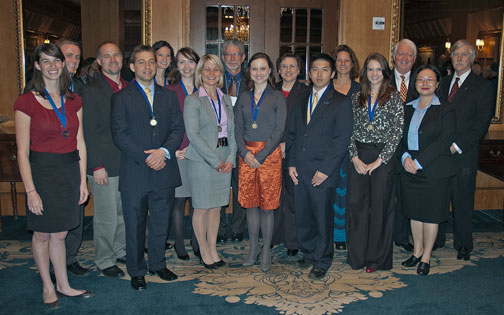Athens, Ga. – The Atlanta chapter of the ARCS® Foundation, Inc. recently awarded $70,000 to nine outstanding doctoral students in biomedical and health sciences at the University of Georgia, one of whom received a special $10,000 grant for global health research abroad. The presentations were made at an awards ceremony held in Atlanta.
The gala event featured keynote speaker Berrien Moore, professor of meteorology, vice president of Weather and Climate Programs, and dean of the College of Atmospheric and Geographic Sciences at Oklahoma University. Moore also serves as director of the National Weather Center.
The ARCS, or Achievement Rewards for College Students, Foundation was founded in Los Angeles in 1958 and is dedicated to helping meet the country’s needs for scientists and engineers by providing scholarships to academically outstanding university students. UGA recipients of the award are selected through the UGA Biomedical and Health Sciences Institute. This year’s ARCS Scholars represent five UGA schools and colleges-the Franklin College of Arts and Sciences, the College of Pharmacy, the Institute of Bioinformatics in the College of Public Health, the College of Veterinary Medicine and the Odum School of Ecology.
The following students are UGA ARCS Foundation Scholars for 2011- 2012:
· Phillip Callihan of Atlanta is a Ph.D. candidate in pharmaceutical and biomedical science. His research focuses on the lipid signaling pathways that regulate growth and cell fate in early neural development and cancer. Currently, he is investigating how Fumonisin B1, a food-borne fungal toxin widely found in developing countries, affects lipid signaling and leads to birth defects of the brain and spinal cord.
· Jason Mock of Dalton is pursuing his Ph.D. in pharmaceutical and biomedical science. His research focuses on nanoparticulate drug delivery. Specifically, he is using differences in enzyme expression between cancer cells and healthy tissues as a means of targeting lipid-based delivery vectors in a prostate cancer model.
· Jenna Oberstaller of Spartanburg, S.C. is a Ph.D. candidate in genetics. Her research in parasitology is focused on addressing global health crises. She is using genomics to develop more sensitive malaria diagnostics, as well as to study the evolution of gene regulatory networks in the apicomplexan parasites responsible for the disease.
· Kathryn Porter of Stockbridge is pursuing her doctorate in foods and nutrition. An advocate for healthy aging and improving the quality of life of older adults, her research area of focus is obesity and its relationship to mental health, eating behaviors, dietary patterns and food insecurity in low income and minority older adults.
· Bonney Reed-Knight is from Habersham County and is pursuing her Ph.D. in psychology. Her doctoral work focuses on pediatric health, with a particular interest in applying psychological research to improving disease outcomes and quality of life in youth with gastrointestinal disorders and solid organ transplants.
· Julie Rushmore of Alpharetta is a DVM/Ph.D. candidate who is receiving training in veterinary medicine and ecology. Her research examines the behavioral and ecological factors that affect disease transmission in African great apes. A former Fulbright Scholar, Rushmore spent a year in western Uganda studying the health and behavior of wild chimpanzees.
· Alecia Septer of Gahanna, Ohio, is a pursuing a Ph.D. in microbiology. For her dissertation work, she is studying the symbiosis between the bioluminescent bacterium Vibrio fischeri and the squid Euprymna scolopes in order to better understand how environmental cues regulate bacterial communication as they colonize their host.
· Timothy Shaw of Johns Creek is a Ph.D. candidate in bioinformatics. He is investigating genetic patterns that facilitate efficient HIV transmission and disease progression and is developing methods to model worldwide HIV diversity, which is critical to vaccine development. Because of his work using multidisciplinary technologies to address global infectious disease, he was selected to receive this year’s $10,000 ARCS Global Impact Grant.
· Katherine Verbist of Clarksville, Tenn. is a doctoral candidate in cellular biology. Her research examines the cellular basis for immunity to mucosal infections, such as influenza. Her current work is studying how cytokines influence the influenza-specific CD8 T cells in the lung airway that confer protection against the disease.
The Atlanta chapter of the ARCS Foundation has awarded more than $2.3 million in scholarships to students at UGA, Emory University, Georgia Institute of Technology and Morehouse College. For more information on the foundation, see www.arcsfoundation.org.
##
Note to editors: An image of the 2011 UGA ARCS delegation is available for download at http://multimedia.uga.edu/media/images/ARCS_group_2011.jpg.
Caption: The UGA ARCS delegation pictured left to right are Julie Rushmore; Phillip Callihan; Brian Cummings, mentor; Jason Mock; Alecia Septer; Bonney Reed-Knight; Kathryn Porter; Ronald Blount, mentor; Katherine Verbist; Mary Ann Johnson, mentor; Timothy Shaw; Kimberly Klonowski, mentor; Jenna Oberstaller; Michael Adams, UGA president; Ming Zhang, mentor; and Harry Dailey, BHSI director.







